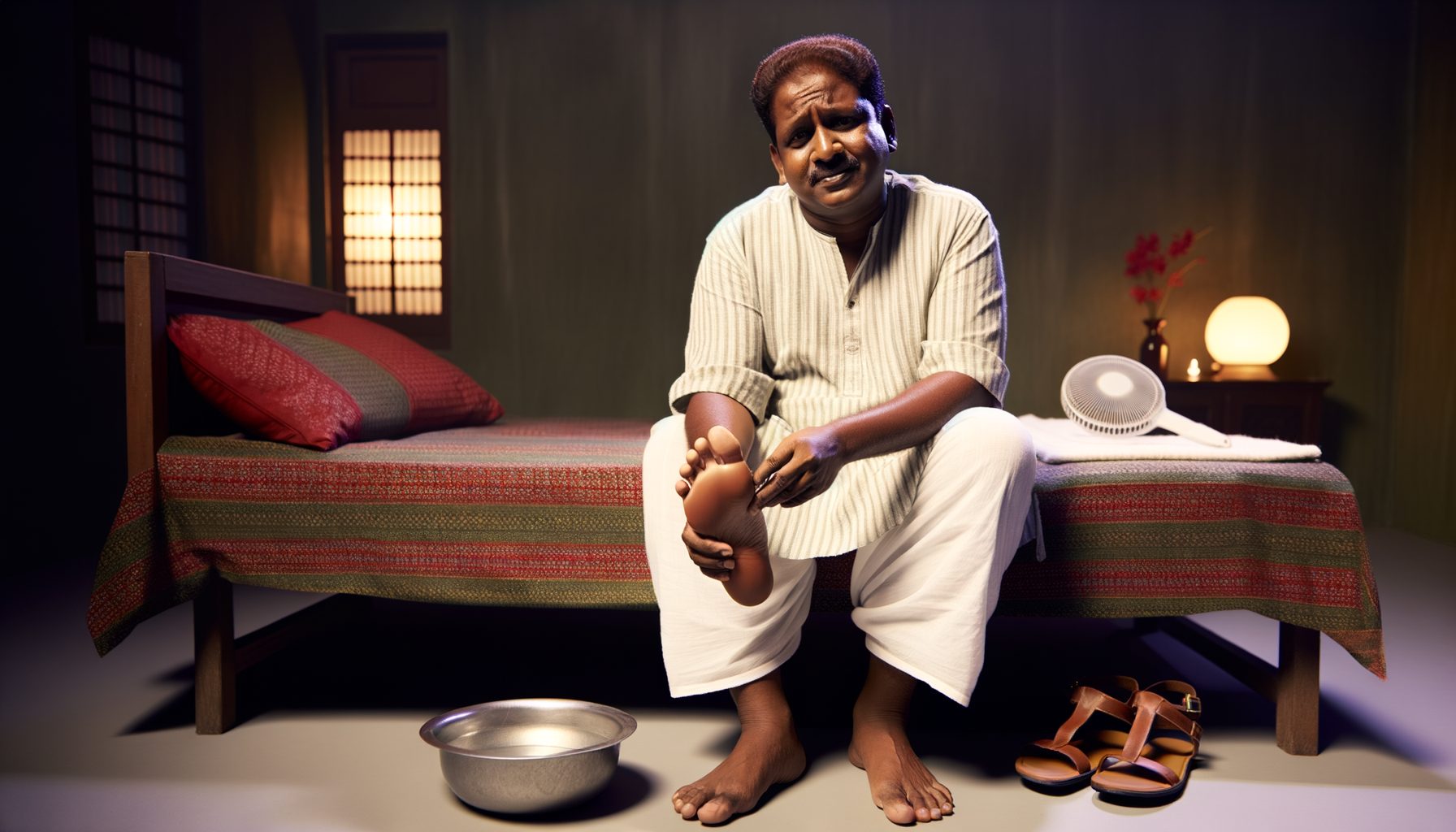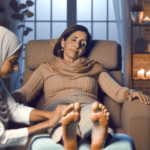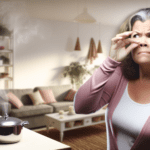Understanding the Symptom: Hot Feet
Hot feet, a sensation often described as a burning or fiery discomfort in the feet, can range from mild to severe and typically occurs at night. While the feet may appear red, other symptoms such as pins and needles, swelling, and numbness can also accompany this hot sensation. Although not as widely discussed as other menopausal symptoms, hot feet can significantly impact quality of life, disrupting sleep and causing distress.
Prevalence and Perception
The prevalence of hot feet during menopause is not as well documented as other symptoms like hot flashes or night sweats. However, anecdotal evidence suggests that a considerable number of women experience this symptom. The perception of hot feet varies, with some women finding it a mere nuisance, while others report substantial discomfort that affects their daily activities and sleep patterns.
The Link Between Menopause and Hot Feet
Menopause brings about a myriad of changes, including hormonal fluctuations that can lead to an increase in body temperature. This condition, sometimes referred to as erythromelalgia, manifests as hot, burning feet. The decline in estrogen levels during perimenopause and menopause is a key factor contributing to this symptom. Additionally, menopause can exacerbate existing conditions such as neuropathy, which may also present as hot feet.
Objective of the Article
The primary objective of this article is to provide a comprehensive understanding of the phenomenon of hot feet during menopause. We aim to explore the physiological underpinnings, associated medical conditions, lifestyle factors, and management strategies. By delving into the causes and contributing factors, we seek to empower women with knowledge and practical advice to manage this symptom effectively. Furthermore, we will discuss when it is appropriate to seek medical advice to ensure that underlying health issues are addressed. Ultimately, this article strives to support women in navigating the challenges of menopause with confidence and informed self-care.
Physiological Explanation of Hot Feet
Hormonal Fluctuations and Body Temperature
During menopause, women experience significant hormonal changes, particularly in the levels of estrogen and progesterone. These hormones are known to influence the body’s thermostat, which is located in the hypothalamus of the brain. As estrogen levels fluctuate and overall decline, this thermostat becomes more sensitive, often leading to an increase in core body temperature. This phenomenon is well-known as hot flashes, but it can also manifest as a sensation of heat in the extremities, including the feet. The increased peripheral blood flow, a process known as distal vasodilation, is the body’s attempt to dissipate heat and can result in hot feet, especially at night when the body prepares for sleep.
Nerve Function and Sensory Changes
Menopause can also affect nerve function, leading to sensory changes. The decline in estrogen levels is associated with a decrease in the production of nerve-protecting factors, which can lead to alterations in nerve function. This can manifest as peripheral neuropathy, where individuals experience burning, tingling, or numbness in their feet. The changes in nerve function may be exacerbated at night due to the body’s natural circadian rhythms, which can alter pain perception and increase the sensation of heat in the feet.
Erythromelalgia and Menopause
Erythromelalgia is a rare condition that can be associated with menopause, characterized by episodes of severe burning pain, increased temperature, and redness in the feet. The exact cause of erythromelalgia is not fully understood, but it is believed to involve abnormal blood flow in the extremities and possibly underlying nerve dysfunction. The condition can be triggered by increased body temperature, which is a common occurrence during menopause due to hormonal changes. While erythromelalgia is not exclusive to menopause, the hormonal changes during this period can exacerbate the symptoms of those who have the condition or potentially trigger its onset in susceptible individuals.
In conclusion, hot feet during menopause can be attributed to a complex interplay of hormonal fluctuations affecting body temperature regulation, changes in nerve function, and conditions such as erythromelalgia. Understanding these physiological underpinnings can help in identifying appropriate management strategies for those experiencing this uncomfortable symptom.
Medical Conditions Related to Hot Feet
Neuropathy and Its Causes
Neuropathy, or nerve damage, is a common cause of hot feet. This condition can result from various medical issues, including diabetic neuropathy, which is a complication of diabetes affecting nerves in the feet and hands. Other causes include Charcot-Marie-Tooth disease, a hereditary neuropathy, and chronic kidney disease, where toxin accumulation due to poor kidney function leads to nerve damage. Hypothyroidism can also cause neuropathy due to low thyroid hormone levels, leading to nerve damage. Additionally, chemotherapy used in cancer treatment can damage nerve cells, contributing to neuropathy.
Nutritional Deficiencies and Nerve Health
Nutritional deficiencies, particularly in vitamins B6, folate, and B12, can contribute to neuropathy. These vitamins are crucial for nerve function, and their lack can lead to significant nerve health issues. Factors such as alcohol abuse, pregnancy, and malnutrition can lead to these deficiencies, increasing the risk of developing hot feet.
Chronic Illnesses and Their Impact on Feet
Chronic illnesses can have a profound impact on foot health. Conditions like HIV and AIDS can cause peripheral neuropathy, leading to hot or burning feet. Guillain-Barré syndrome, an autoimmune disorder, and chronic inflammatory demyelinating polyneuropathy (CIDP) can also lead to similar symptoms. Erythromelalgia, a rare condition characterized by intense pain and heat in the feet, is another chronic illness that can cause hot feet.
Medication-Induced Neuropathy
Certain medications can contribute to neuropathy, leading to symptoms of hot feet. These include heart drugs such as amiodarone and hydralazine, chemotherapy drugs like cisplatin and paclitaxel, and infection fighters such as chloroquine and isoniazid. Drugs used for autoimmune diseases (e.g., etanercept and infliximab), antiseizure medications (e.g., carbamazepine and phenytoin), and others like emtricitabine and tenofovir can also induce neuropathy. It is essential to review medications with a healthcare provider if hot feet are a concern.

Bette 100% All-Natural Relaxing Lavender Body Lotion.
Chemical-Free
Your relaxing night time body moisturizer to leave the day’s stress behind. Decompress and wish your body good night with the calming scent of lavender.
Lifestyle and Environmental Factors
Footwear and Foot Care
Choosing the right footwear is crucial for managing hot feet during menopause. Shoes that are too tight or made from synthetic materials can trap heat and exacerbate the sensation of hot feet. It’s important to select shoes that fit well and are made from natural, breathable materials like leather or canvas. Additionally, alternating shoes can help prevent the buildup of heat and moisture. For those experiencing hot feet, it’s advisable to:
- Wear different shoes every other day to allow them to air out.
- Ensure shoes are well-fitted and provide good airflow.
- Use supportive inserts if necessary.
- Change socks regularly, especially after exercise, opting for moisture-wicking materials.
- Avoid wearing damp footwear.
Proper foot care also plays a role in managing hot feet. Regularly soaking the feet in cool water, using foot powders to absorb excess moisture, and avoiding prolonged periods of standing can help cool down hot feet.
Physical Activity and Posture
Engaging in regular physical activity can improve circulation and help regulate body temperature, which may alleviate symptoms of hot feet. Low-impact exercises such as swimming, cycling, or yoga can be particularly beneficial. It’s also important to pay attention to posture when standing or sitting for extended periods, as poor posture can impede blood flow and contribute to foot discomfort. Tips for maintaining good posture include:
- Standing evenly on both feet without leaning to one side.
- Using a footrest when sitting to elevate the feet slightly.
- Taking frequent breaks to walk around and stretch.
Infections and Skin Conditions
Fungal infections like athlete’s foot can cause burning sensations and contribute to the feeling of hot feet. To prevent infections:
- Wear flip-flops in public showers and pools.
- Keep feet clean and dry.
- Treat any fungal infections promptly to prevent spreading.
Other skin conditions, such as eczema or psoriasis, can also affect the feet. Managing these conditions with appropriate skincare and medical treatments can help reduce the sensation of hot feet.
By addressing these lifestyle and environmental factors, women going through menopause can take proactive steps to manage the discomfort associated with hot feet. It’s important to combine these strategies with medical advice for optimal relief.

Natural Management Strategies for Hot Feet
Assessing and Addressing Medical Causes
Before exploring natural remedies for hot feet, it’s crucial to identify any underlying medical conditions that may be contributing to the symptom. Conditions such as diabetic neuropathy, nutritional deficiencies, and hypothyroidism can lead to neuropathy and the sensation of hot feet. Consulting with a healthcare provider can help determine if there’s a need for medical intervention, such as regulating blood sugar levels or addressing vitamin deficiencies. Once medical causes are assessed and addressed, natural management strategies can be more effective.
Alternative Therapies: Acupuncture and Others
Acupuncture is a traditional Chinese medicine technique that involves inserting thin needles into specific points on the body to stimulate nerves, muscles, and connective tissue. This can improve blood flow and nerve function, potentially alleviating symptoms of hot feet. Other alternative therapies that may offer relief include acupressure and massage, which can also promote circulation and reduce discomfort.
Footwear and Lifestyle Adjustments
- Proper Footwear: Ensure that all shoes fit correctly and provide adequate airflow to prevent overheating. Consider using supportive inserts and changing shoes regularly to allow them to air out.
- Moisture-Wicking Socks: Opt for socks that wick moisture away from the skin, such as those made from natural fibers like cotton, or specialized synthetic materials designed for this purpose.
- Hygiene: Maintain good foot hygiene by changing socks frequently, especially after exercise, and by keeping feet clean and dry.
- Environment: Avoid prolonged exposure to heat and standing for extended periods, which can exacerbate the sensation of hot feet.
Cooling Techniques and Home Remedies
Several home remedies can provide temporary relief from hot feet:
- Cool Water Soaks: Soaking feet in a basin of cool water can help reduce the sensation of heat.
- Elevation: Elevating the feet can improve circulation and reduce swelling, which may contribute to hot feet.
- Cooling Products: Applying cooling gels or creams designed for foot care can provide relief. Additionally, placing a fan at the foot of the bed or using gel socks can help keep feet cool during sleep.
- Natural Supplements: Supplements such as alpha-lipoic acid, amino acids, and vitamins B6, B12, and folate may support nerve health. However, it’s important to consult with a healthcare provider before starting any new supplement regimen.
- Topical Treatments: For those with conditions like athlete’s foot, antifungal creams can alleviate symptoms. Capsaicin cream may also help with neuropathic pain, though its use should be discussed with a healthcare professional.
Implementing these strategies can help manage the discomfort of hot feet naturally. However, if symptoms persist or worsen, it’s important to seek medical advice to rule out more serious conditions.
When to Seek Medical Advice
Recognizing Signs of Nerve Damage
During menopause, hot feet can be a common symptom, but it’s important to differentiate between a menopausal symptom and potential nerve damage, also known as neuropathy. Signs of nerve damage in the feet may include a persistent burning sensation, tingling, or numbness. These symptoms may intensify at night, disrupting sleep. If you notice changes in skin color or texture, loss of reflexes, or muscle weakness, these could also be indicative of nerve damage. It’s crucial to monitor these symptoms closely, as they can progressively worsen over time.
Symptoms Warranting Immediate Attention
Some symptoms should prompt immediate medical attention. Contact your healthcare provider if you experience:
- Sudden loss of feeling in your toes or feet.
- Severe pain that does not improve with rest or over-the-counter pain relief.
- Changes in foot appearance, such as swelling, redness, or wounds that do not heal.
- Alterations in walking patterns or balance, which could indicate nerve damage progression.
- Systemic symptoms like fever or weight loss, which could suggest a more serious underlying condition.
These symptoms could be signs of severe neuropathy or other medical conditions that require prompt diagnosis and treatment.
Consulting Healthcare Professionals
It’s essential to consult healthcare professionals if you’re experiencing persistent hot feet, especially if accompanied by the signs mentioned above. A healthcare provider can perform a thorough examination, which may include neurological tests, blood tests, and possibly imaging studies to determine the cause of your symptoms. They can also rule out other conditions such as erythromelalgia, infections, or systemic diseases that could be contributing to your discomfort.
Remember, while some menopausal symptoms can be managed with lifestyle changes and home remedies, persistent or severe symptoms should always be evaluated by a professional. Early intervention can prevent further nerve damage and improve your quality of life during menopause.
Moreover, if you have a pre-existing condition like diabetes or thyroid disorders, regular foot examinations are crucial as these conditions can exacerbate nerve damage and lead to complications. Your healthcare provider can work with you to create a management plan tailored to your needs.
In conclusion, while hot feet can be a part of the menopausal experience, it’s important to stay vigilant about your foot health. By recognizing the signs of nerve damage, understanding when to seek immediate medical attention, and consulting with healthcare professionals, you can navigate this symptom more effectively and maintain your overall well-being.
Conclusion: Navigating Menopause and Hot Feet
Throughout this article, we have explored the multifaceted issue of hot feet during menopause, a symptom that can range from mild discomfort to severe disruption of daily life and sleep. We’ve learned that hormonal fluctuations, particularly the decline in estrogen, play a significant role in the development of this symptom by affecting the body’s ability to regulate temperature and blood flow. Additionally, we’ve discussed various medical conditions, such as neuropathy and erythromelalgia, that can be related to or exacerbated by menopause and contribute to the sensation of hot feet.
Lifestyle and environmental factors, including footwear choices and physical activity, can influence the severity of hot feet. We’ve also considered natural management strategies, emphasizing the importance of addressing medical causes, exploring alternative therapies, making footwear and lifestyle adjustments, and employing cooling techniques and home remedies.
Empowerment Through Knowledge and Self-Care
Understanding the causes and potential treatments for hot feet during menopause empowers women to take proactive steps towards managing their symptoms. Self-care practices, such as selecting appropriate footwear, engaging in regular foot care, and staying hydrated, can make a significant difference in comfort levels. Additionally, incorporating relaxation techniques and maintaining a cool environment, especially at night, can help alleviate the discomfort associated with hot feet.
The Importance of Medical Support
While self-care and lifestyle adjustments are valuable, recognizing when to seek medical advice is crucial. Persistent or severe symptoms, signs of nerve damage, or symptoms that warrant immediate attention should prompt a consultation with healthcare professionals. Medical support can provide a comprehensive evaluation, rule out underlying conditions, and offer treatment options tailored to individual needs, such as hormone replacement therapy or medications for neuropathic pain.
In conclusion, navigating the challenges of menopause and hot feet requires a combination of knowledge, self-care, and medical support. By understanding the underlying causes, implementing effective management strategies, and seeking professional advice when necessary, women can find relief from hot feet and improve their overall well-being during this transitional phase of life.



















